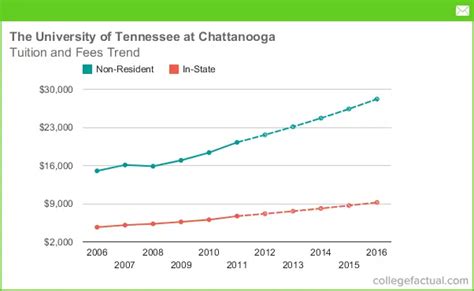Higher education is a significant investment, and understanding the associated costs is crucial. This article provides comprehensive information on the University of Tennessee’s (UT) tuition fees and associated expenses. Whether you’re a prospective student, a parent, or simply curious about UT’s financial landscape, this detailed guide will equip you with the knowledge you need to make informed decisions.

In-State vs Out-of-State Tuition Fees
As with most universities in the United States, UT differentiates tuition fees for students residing within Tennessee (in-state) and those from other states (out-of-state).
In-State Undergraduate Tuition Fees
- Knoxville campus: $13,312 per year
- Chattanooga, Martin, and Memphis campuses: $9,534 per year
Out-of-State Undergraduate Tuition Fees
- Knoxville campus: $29,052 per year
- Chattanooga, Martin, and Memphis campuses: $21,870 per year
In-State Graduate Tuition Fees
- Knoxville campus: $10,374 per year
- Chattanooga, Martin, and Memphis campuses: $8,142 per year
Out-of-State Graduate Tuition Fees
- Knoxville campus: $24,288 per year
- Chattanooga, Martin, and Memphis campuses: $20,280 per year
Additional Expenses Beyond Tuition
While tuition is a major factor in determining the overall cost of attendance, it’s essential to consider additional expenses such as:
Fees
- Student fees: $1,576 per year (undergraduate)
- Graduation fee: $65
- Technology fee: $150 per semester
- Health fee: $254 per semester
Housing
- On-campus housing: $3,500-$7,000 per semester
- Off-campus housing: Varies depending on location and type
Meals
- Meal plan: $2,500-$3,500 per semester
- Groceries (off-campus): $300-$600 per month
Transportation
- Parking permit: $300-$500 per year
- Public transportation: $60-$100 per month
Books and Supplies
- Books and course materials: $1,000-$1,500 per year
- Lab fees: $50-$200 per course
Financial Aid and Scholarships
UT recognizes the financial challenges students face and offers various forms of financial aid and scholarships:
- Pell Grants (federal aid based on financial need)
- Subsidized and unsubsidized student loans
- Tennessee Student Assistance Award Program (state-funded need-based aid)
- Numerous merit-based scholarships awarded to students with academic achievements and leadership qualities
Average Annual Cost of Attendance
To provide a comprehensive view, here’s an estimate of the average annual cost of attendance for in-state and out-of-state students at UT’s Knoxville campus (based on 2023-2024 fees):
| Category | In-State | Out-of-State |
|---|---|---|
| Tuition | $13,312 | $29,052 |
| Fees | $3,152 | $3,152 |
| Housing | $7,000 | $7,000 |
| Meals | $3,000 | $3,000 |
| Transportation | $500 | $500 |
| Books and Supplies | $1,500 | $1,500 |
| Total | $28,464 | $44,204 |
Factors Influencing Tuition Fees
UT’s tuition fees are determined by various factors, including:
- The cost of providing high-quality education, including faculty salaries, research facilities, and academic services
- State funding and appropriations
- Student enrollment and demand for programs
- Inflation and economic conditions
Payment Options and Deadlines
UT provides students with flexible payment options:
- Cash or Check: Send payments directly to the UT Bursar’s Office.
- Credit Card: Pay online or over the phone (fees may apply).
- Payment Plan: Enroll in a monthly payment plan to spread out tuition costs over several installments.
Payment Deadlines: Tuition payment deadlines vary depending on the semester and student status. Students can find specific deadlines on the UT Bursar’s Office website or by contacting the office directly.
Conclusion
The University of Tennessee provides a comprehensive and affordable higher education experience. By understanding the tuition fees and associated expenses, prospective students can make informed financial decisions. UT’s commitment to financial aid and scholarships ensures that students with financial need have access to quality education. With its exceptional faculty, state-of-the-art facilities, and commitment to student success, UT offers a compelling value for students seeking a transformative university experience.
FAQs
Q1: Are tuition fees the same for all UT campuses?
A1: No, tuition fees may vary slightly between UT campuses due to program offerings and local expenses.
Q2: What scholarships are available for out-of-state students?
A2: UT offers several merit-based scholarships specifically for out-of-state students, such as the Chancellor’s Scholarship and the Trustee Scholarship.
Q3: Can I work while studying at UT to cover expenses?
A3: Yes, UT encourages student employment and offers on-campus and off-campus job opportunities through the Career Services Center.
Q4: What is the average tuition increase at UT per year?
A4: Historically, UT’s tuition fees have increased by an average of 2-3% per year, subject to approval by the Board of Trustees.
Q5: Are there any resources available to help me manage the cost of attendance?
A5: Yes, UT provides financial counseling services, budgeting workshops, and a financial aid counseling hotline to assist students with financial planning.
